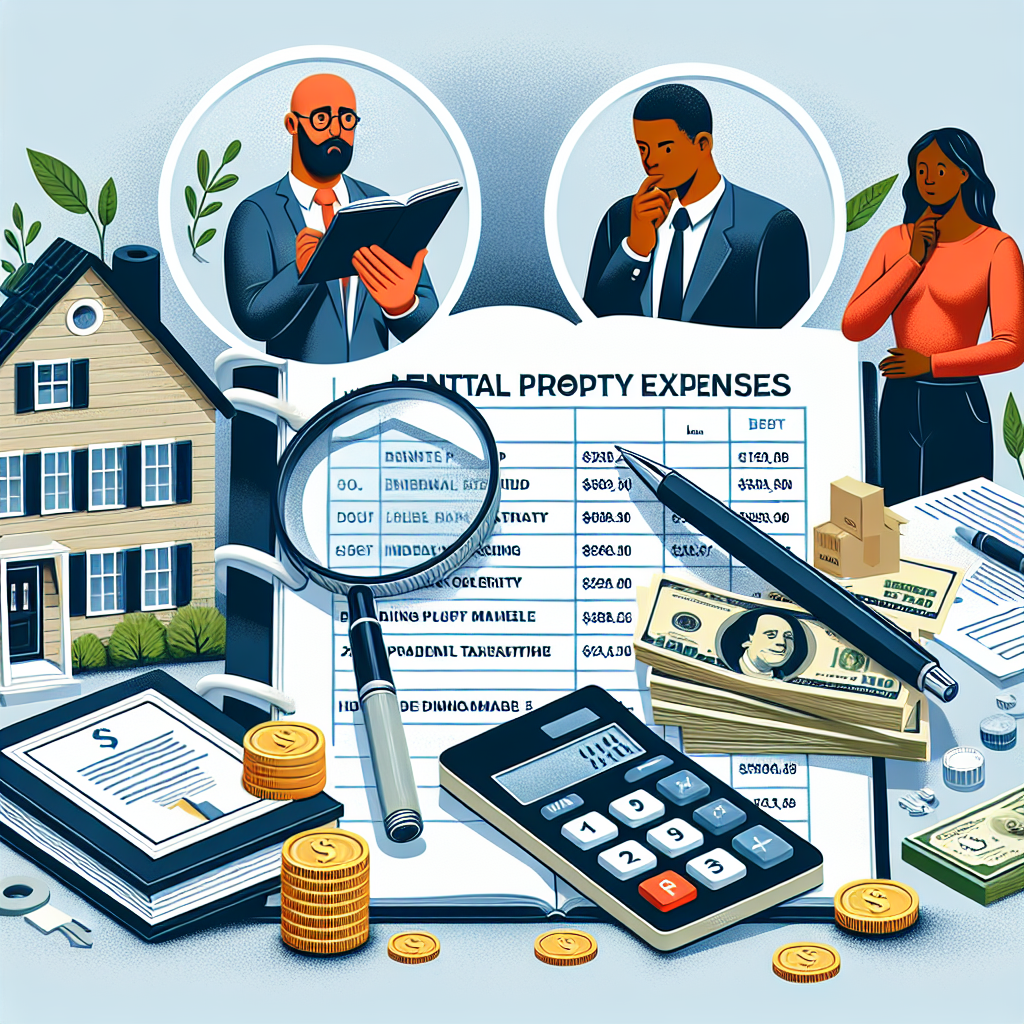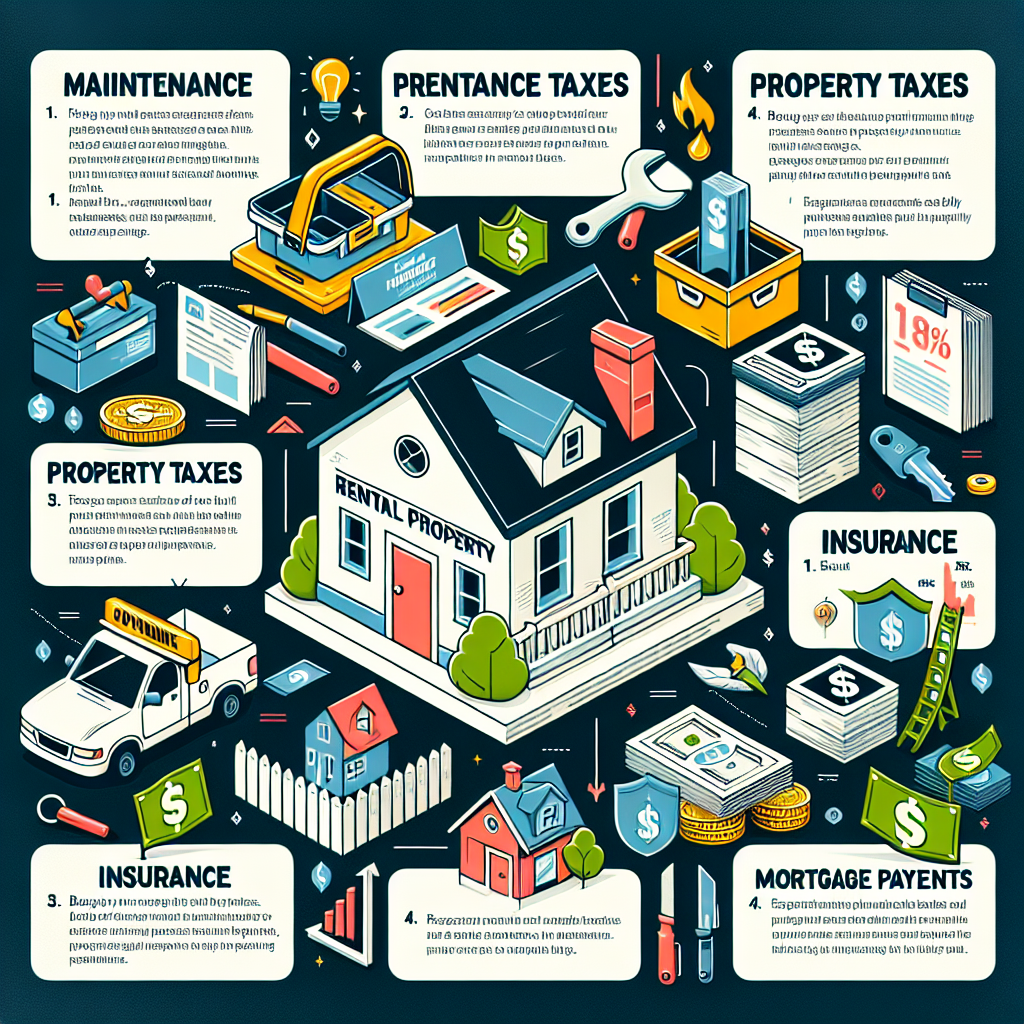-
Table of Contents
- Essential Rental Property Expenses Every Rookie Must Know
- 1. Mortgage Payments
- 2. Property Taxes
- 3. Insurance
- 4. Maintenance and Repairs
- 5. Property Management Fees
- 6. Utilities
- 7. Homeowners Association (HOA) Fees
- 8. Vacancy Costs
- 9. Marketing and Advertising
- 10. Legal and Accounting Fees
- Case Study: Calculating Total Monthly Expenses
- Conclusion
Essential Rental Property Expenses Every Rookie Must Know

Investing in rental properties can be a lucrative venture, but it comes with its own set of challenges and expenses. For rookie landlords, understanding these costs is crucial to ensure profitability and avoid financial pitfalls. This article delves into the essential rental property expenses every beginner must know, providing valuable insights, examples, and statistics to help you make informed decisions.
1. Mortgage Payments
One of the most significant expenses for rental property owners is the mortgage payment. This includes both the principal and interest on the loan used to purchase the property. It’s essential to factor in these payments when calculating your potential rental income.
For example, if you purchase a property for $200,000 with a 20% down payment and a 30-year fixed mortgage at an interest rate of 4%, your monthly mortgage payment would be approximately $764. This amount must be covered by your rental income to ensure profitability.
2. Property Taxes
Property taxes are another significant expense that varies depending on the location of your rental property. These taxes are typically assessed annually and can be a substantial portion of your overall expenses.
According to the Tax Foundation, the average property tax rate in the United States is 1.07% of the property’s assessed value. For a $200,000 property, this would amount to $2,140 per year or about $178 per month.
3. Insurance
Insurance is a non-negotiable expense for rental property owners. Landlord insurance policies typically cover property damage, liability, and loss of rental income. The cost of insurance can vary based on factors such as the property’s location, size, and age.
On average, landlord insurance costs between $800 and $1,200 per year. For a $200,000 property, you can expect to pay around $1,000 annually or approximately $83 per month.
4. Maintenance and Repairs
Regular maintenance and unexpected repairs are inevitable when owning rental properties. These expenses can range from minor fixes like leaky faucets to major repairs such as roof replacements.
It’s advisable to set aside 1% to 2% of the property’s value annually for maintenance and repairs. For a $200,000 property, this would amount to $2,000 to $4,000 per year or $167 to $333 per month.
5. Property Management Fees
If you choose to hire a property management company, you’ll need to account for their fees. Property managers typically charge a percentage of the monthly rental income, usually between 8% and 12%.
For instance, if your property generates $1,500 in monthly rent and your property manager charges 10%, you’ll pay $150 per month in management fees.
6. Utilities
Depending on your rental agreement, you may be responsible for covering some or all of the property’s utility costs. These can include water, electricity, gas, and trash removal.
It’s essential to clarify with your tenants which utilities they are responsible for and include this information in the lease agreement. On average, utility costs can range from $100 to $300 per month, depending on the property’s size and location.
7. Homeowners Association (HOA) Fees
If your rental property is part of a homeowners association, you’ll need to pay HOA fees. These fees cover the maintenance of common areas, amenities, and other services provided by the association.
HOA fees can vary widely, ranging from $100 to $500 per month or more, depending on the community and the services offered.
8. Vacancy Costs
Vacancies are an inevitable part of owning rental properties. During periods when your property is unoccupied, you’ll need to cover the mortgage, utilities, and other expenses without rental income.
It’s essential to budget for vacancies by setting aside a portion of your rental income. A common rule of thumb is to allocate 5% to 10% of your annual rental income for vacancy costs.
9. Marketing and Advertising
Attracting tenants requires effective marketing and advertising. This can include online listings, signage, and other promotional efforts.
Marketing costs can vary, but it’s essential to budget for these expenses to ensure your property remains occupied. On average, you can expect to spend between $50 and $200 per month on marketing and advertising.
10. Legal and Accounting Fees
Legal and accounting services are essential for managing rental properties. These professionals can help with lease agreements, tax filings, and other legal and financial matters.
Legal and accounting fees can vary based on the complexity of your needs. On average, you can expect to pay between $500 and $1,500 per year for these services.
Case Study: Calculating Total Monthly Expenses
Let’s consider a case study to illustrate the total monthly expenses for a rental property. Suppose you own a $200,000 rental property with the following expenses:
- Mortgage Payment: $764
- Property Taxes: $178
- Insurance: $83
- Maintenance and Repairs: $250 (average of 1.5% annually)
- Property Management Fees: $150 (10% of $1,500 rent)
- Utilities: $200
- HOA Fees: $200
- Vacancy Costs: $125 (5% of $1,500 rent)
- Marketing and Advertising: $100
- Legal and Accounting Fees: $100 (average of $1,200 annually)
Total Monthly Expenses: $2,150
In this case, your rental property would need to generate at least $2,150 in monthly rent to cover these expenses and break even. Any additional rental income would contribute to your profit.
Conclusion
Understanding the essential rental property expenses is crucial for rookie landlords to ensure profitability and avoid financial pitfalls. By accounting for mortgage payments, property taxes, insurance, maintenance and repairs, property management fees, utilities, HOA fees, vacancy costs, marketing and advertising, and legal and accounting fees, you can create a comprehensive budget and make informed decisions about your rental property investments.
By carefully managing these expenses and setting aside funds for unexpected costs, you can maximize your rental property’s profitability and achieve long-term success in the real estate market.








